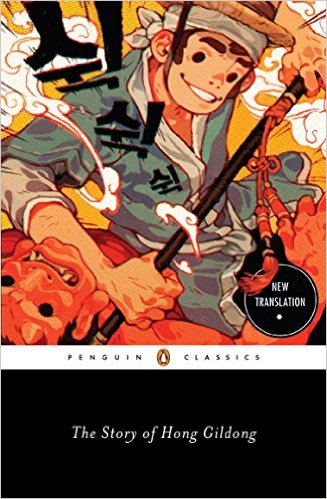The Story of Hong Gildong, translated by Minsoo Kang
Apr 4
2016

The Story of Hong Gildong is a classic Korean novel, widely—but perhaps inaccurately—attributed to the 17th century author and courtier Heo Gyun. The character of Hong Gildong is so widely known in Korea that his name is routinely used as the instructional example on forms (à la “John Doe”). Western readers can now judge his story for themselves, as Penguin Classics has recently released a new translation of the text.
The novel opens with the birth and boyhood of Hong Gildong, the illegitimate son of a government minister. Hong Gildong possesses incredible powers (seriously: Marvel superheroes would be jealous), but his status as an illegitimate child limits his future prospects. When his unfulfilled ambitions put his family at risk, he leaves home and becomes the leader of a band of Robin Hood-style outlaws. His adventures bring him to the attention of kings, monsters, and beautiful women, but Hong Gildong never forgets his wish to become a fully-accepted member of society.
This edition of The Story of Hong Gildong features 77 pages of actual story and 41 pages of introduction and explanatory notes, all written by translator Minsoo Kang. You'd think that would be overkill, considering the length of the text, but I found myself wishing the informational bits were both longer and based on the research of more than one person. I have complained (often and at length) about the near-impossibility of a single person successfully annotating an entire book, and that is once again true here. Kang's essay introduces enough information to justify a full-length scholarly text, including, but not limited to:
1. Attempting to explain the unique role The Story of Hong Gildong plays in the Korean consciousness
2. Giving readers a functional understanding of the cultural and social conditions featured in the story
3. Casting doubt on the nearly universally-held belief that the story was written by Heo Gyun, arguing instead that it was the work of a 19th century pop-fiction writer. (If Kang is to be believed, this sounds like the equivalent of discovering that Romeo and Juliet was actually written by a Victorian romance novelist.)
I am not suggesting any of Kang's information is inaccurate, but few of his ideas are explored in sufficient depth. I was left with a number of unanswered questions—and, thanks to The Story of Hong Gildong's grossly inadequate Wikipedia entry, I suspect most of those questions are doomed to remain unanswered. While I am sincerely grateful to Penguin for making this classic text available to Western readers, I just as sincerely wish they had devoted enough time, money, and page space to ensure that we could appreciate it in its proper context.
The novel opens with the birth and boyhood of Hong Gildong, the illegitimate son of a government minister. Hong Gildong possesses incredible powers (seriously: Marvel superheroes would be jealous), but his status as an illegitimate child limits his future prospects. When his unfulfilled ambitions put his family at risk, he leaves home and becomes the leader of a band of Robin Hood-style outlaws. His adventures bring him to the attention of kings, monsters, and beautiful women, but Hong Gildong never forgets his wish to become a fully-accepted member of society.
This edition of The Story of Hong Gildong features 77 pages of actual story and 41 pages of introduction and explanatory notes, all written by translator Minsoo Kang. You'd think that would be overkill, considering the length of the text, but I found myself wishing the informational bits were both longer and based on the research of more than one person. I have complained (often and at length) about the near-impossibility of a single person successfully annotating an entire book, and that is once again true here. Kang's essay introduces enough information to justify a full-length scholarly text, including, but not limited to:
1. Attempting to explain the unique role The Story of Hong Gildong plays in the Korean consciousness
2. Giving readers a functional understanding of the cultural and social conditions featured in the story
3. Casting doubt on the nearly universally-held belief that the story was written by Heo Gyun, arguing instead that it was the work of a 19th century pop-fiction writer. (If Kang is to be believed, this sounds like the equivalent of discovering that Romeo and Juliet was actually written by a Victorian romance novelist.)
I am not suggesting any of Kang's information is inaccurate, but few of his ideas are explored in sufficient depth. I was left with a number of unanswered questions—and, thanks to The Story of Hong Gildong's grossly inadequate Wikipedia entry, I suspect most of those questions are doomed to remain unanswered. While I am sincerely grateful to Penguin for making this classic text available to Western readers, I just as sincerely wish they had devoted enough time, money, and page space to ensure that we could appreciate it in its proper context.
Posted by: Julianka
No new comments are allowed on this post.
Comments
No comments yet. Be the first!